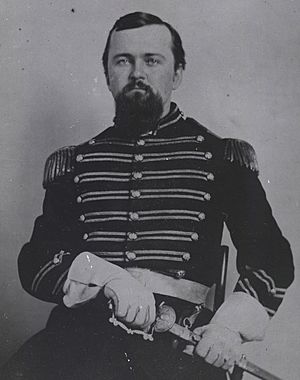William L. Saunders facts for kids
Quick facts for kids
William L. Saunders
|
|
|---|---|
 |
|
| 11th Secretary of State of North Carolina | |
| In office 1879–1891 |
|
| Governor | Thomas Jordan Jarvis Alfred Moore Scales |
| Preceded by | Joseph A. Engelhard |
| Succeeded by | Octavius Coke |
| Personal details | |
| Born | July 30, 1835 Raleigh, North Carolina |
| Died | April 2, 1891 (aged 55) Raleigh, North Carolina |
| Political party | Democratic |
| Spouse |
Florida Cotten
(m. 1864) |
| Parents | Joseph Hubbard Saunders Laura J. Baker Saunders |
| Alma mater | University of North Carolina |
| Profession | Lawyer, Politician |
| Military service | |
| Allegiance | |
| Branch/service | |
| Rank | |
| Commands | 46th North Carolina Infantry |
| Battles/wars | American Civil War |
William Laurence Saunders (1835-1891) was an important person in North Carolina history. He was an American lawyer, a newspaper editor, and a historian. From 1879 until he passed away in 1891, he served as the North Carolina Secretary of State.
Contents
Early Life and Military Service
William Saunders was born on July 30, 1835. He grew up in Raleigh, North Carolina. He later attended the University of North Carolina at Chapel Hill.
Serving in the Civil War
During the American Civil War, William Saunders joined the Confederate States Army. He became a colonel, which is a high rank. He led a group of soldiers called the 46th North Carolina Infantry Regiment.
He was hurt in two major battles. These were the Battle of Fredericksburg and the Battle of the Wilderness. After the war, he continued to be involved in public service.
Public Service and State Leadership
After his time in the military, Saunders worked in government. He was the chief clerk for the North Carolina Senate for several years. This job involves managing official papers and records.
Becoming Secretary of State
In 1879, the Governor of North Carolina, Thomas Jordan Jarvis, chose William Saunders to be the Secretary of State. He took over this role after the previous Secretary of State passed away.
Saunders was very popular in this position. He won elections to keep the job in 1880, 1884, and 1888. He served as Secretary of State until his death in 1891.
Contributions to History and Education
William Saunders was also a dedicated historian. He worked on a huge project to collect and publish historical documents.
Editor of Colonial Records
He was the editor of a ten-volume series. This series was called Colonial Records of North Carolina. It contained many important historical papers. These records help us understand North Carolina's past.
University Trustee
Saunders was also very involved with his old school. He was a member of the Board of Trustees for the University of North Carolina at Chapel Hill. He also served as the secretary-treasurer for the board. This role meant he helped manage the university.
Legacy and Building Renaming
For many years, a building at the University of North Carolina at Chapel Hill was named after William Saunders. It was called Saunders Hall. This was to honor his service as a Confederate veteran and a university trustee.
Why the Name Changed
However, William Saunders was also a leader in a group that caused much debate. Because of his involvement with this group, students at the university began to ask for the building's name to be changed. They felt it was important to recognize the controversial nature of the group he led.
In 2015, the university decided to rename the building. It is now called "Carolina Hall." This change reflects a modern understanding of historical figures.
Final Resting Place
William Laurence Saunders passed away in 1891. He is buried in the graveyard at Calvary Episcopal Church. This church is located in Tarboro, North Carolina.
 | Percy Lavon Julian |
 | Katherine Johnson |
 | George Washington Carver |
 | Annie Easley |

